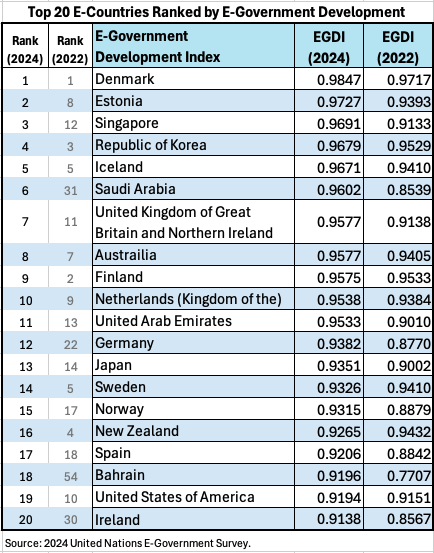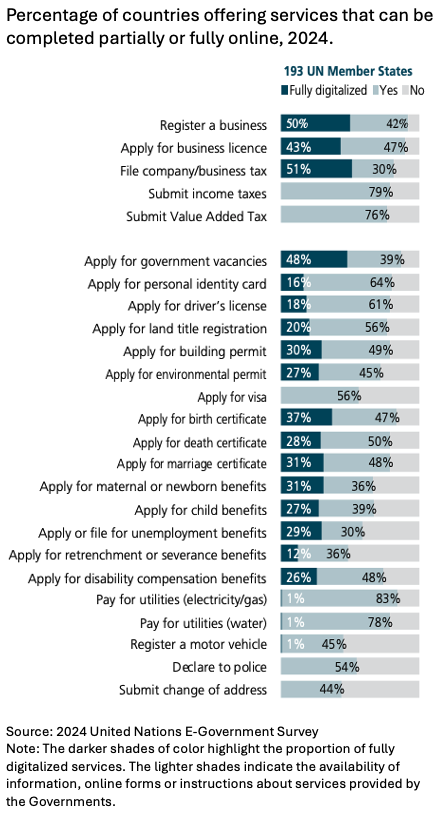UN report: E-government makes global strides, but digital divide persists

A newly released 2024 E-Government Survey from the United Nations paints a picture of significant progress in the global pursuit of digital government. Compared to just a few years ago, a vast majority of countries are leveraging technology and delivering an expanding range of digital services to citizens and businesses.
However, while all regions throughout the world are using technology to enhance public services and citizen engagement, significant disparities remain.
The newly released 2024 report — the latest in a series that began in 2001 — provides a comprehensive overview of e-government development from global, regional, national and local perspectives for 193 UN member states. The findings are based on a combination of factors, including online government services, telecommunications infrastructure, adult literacy and digital participation.
Europe continues to lead in e-government development, followed by Asia, the Americas, Oceania, and Africa, based on the UN’s E-Government Development Index (EGDI). While all regions have made significant progress in recent years, the pace of development is uneven, and regional disparities exist.
Overall, the UN reports the proportion of the population lagging behind in digital government development has dropped from 45% in 2022 to 22.4% in 2024. However, this progress masks a persistent digital divide, with 1.73 billion people still needing access to basic digital services. The gaps are particularly wide in Africa and Oceania.

Denmark, Estonia, Singapore, Republic of Korea and Iceland continue to lead the list of top 20 countries with the most mature digital public services, based on their relative EGDI rankings. Saudia Arabia, the United Arab Emirates and Bahrain also placed high on the list, reflecting significant gains compared to the UN’s last study in 2022. The United States, which ranked 10th two years ago, has slipped to 19th in the UN’s latest report, surpassed by the United Kingdom, Australia, Germany, Japan, Sweden, Norway and Spain. That, in part, reflects continuing gaps in high-speed broadband coverage in parts of the U.S.
Vincenzo Aquaro, chief of the Digital Government Branch within the UN’s Department of Economic and Social Affairs, which produced the survey, emphasized the importance of looking beyond the rankings.
“Focusing on policy recommendations and exploring new methodological frameworks, like the Digital Government Model Framework introduced in this edition, can provide a more comprehensive understanding of each country’s digital government initiatives and progress,” he said in comments posted on LinkedIn.
The model framework provides a roadmap for countries to effectively plan, implement, and assess their digital government initiatives, according to Aquaro. It emphasizes an ecosystem approach, focusing on good governance, inclusivity, and security and aims to leverage digital technologies to enhance public service delivery, promote inclusivity, and achieve sustainable development goals.
The report delves into the development of digital government on a regional basis, noting a pronounced shift towards digital technologies that accelerated during the post-pandemic recovery period. That shift was fueled by increased investment in resilient infrastructures and advanced solutions such as cloud computing and broadband, and by increased computing power, decreased costs, and the explosion of data due to mobile device proliferation.
“The public sector’s example has stimulated demand for new digital services, promoting digital entrepreneurship and creating technology-driven job opportunities. These transformations have collectively contributed to more robust, sustainable, and resilient economies better prepared for current challenges and future uncertainties,” the report notes.
The survey also highlights the importance of local-level digital government, which is often the first point of contact for citizens seeking public services. However, the report observes that a significant gap exists between national and local e-government development, with many cities lacking a basic online presence. The report calls for focused efforts to bridge this gap and ensure smaller municipalities are included.
The promise and peril of AI
New to this year’s report is a chapter on the potential impact of artificial intelligence in the public sector. While AI can automate processes, enhance efficiency, and improve decision-making, its rapid development has outpaced regulatory frameworks, observed Aquaro.
“It’s important to note that the number of countries with AI legislation still falls significantly short of those with the well-established digital government strategies,” Aquaro said at a UN press briefing accompanying the survey’s release. “This gap highlights the need for more synchronized efforts between AI regulations and existing digital government framework, as well as the need for integration with broader digital government strategies to ensure smooth implementation and avoid potential governance conflict.”
Among other findings, the survey notes:
- Improved telecommunications infrastructure is accelerating overall e-government development.
- Governments are providing better access to public information and refining content to promote inclusiveness.
- Countries are expanding the range of services they provide online (see chart below).
- Roughly nine out of ten countries publish open data sets for national and sector-specific budgets and expenditures.
- The legislative framework supporting e-government still varies significantly across regions.
- Countries are steadily moving towards digitalizing public procurement.
The survey suggests that governments, international organizations, and the private sector must work more closely to accelerate digital government development, bridge the digital divide, and ensure digital technologies are used responsibly and inclusively to benefit all citizens.
In particular, it stressed the need for:
- Increased financing for digital government initiatives, particularly in developing countries
- Enhanced cybersecurity measures to protect critical infrastructure and data
- Capacity-building, including investing in training and development programs to equip government officials and citizens with the skills needed to thrive in a digital society
- International collaboration to share best practices, develop common standards, and address common challenges in digital government development

This report was updated on September 18 to incorporate additional comments from Vincenzo Aquaro about the e-goverment survey.



